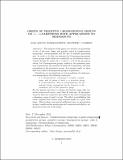Files in this item
Orbits of primitive k-homogenous groups on (n-k)-partitions with applications to semigroups
Item metadata
| dc.contributor.author | Araújo, João | |
| dc.contributor.author | Bentz, Wolfram | |
| dc.contributor.author | Cameron, Peter Jephson | |
| dc.date.accessioned | 2017-08-08T11:30:11Z | |
| dc.date.available | 2017-08-08T11:30:11Z | |
| dc.date.issued | 2019-01-01 | |
| dc.identifier | 249954068 | |
| dc.identifier | 9f4d8b99-4c99-4360-91ab-569d0d5c7e40 | |
| dc.identifier | 85062177357 | |
| dc.identifier | 000452652400004 | |
| dc.identifier.citation | Araújo , J , Bentz , W & Cameron , P J 2019 , ' Orbits of primitive k -homogenous groups on ( n - k )-partitions with applications to semigroups ' , Transactions of the American Mathematical Society , vol. 371 , no. 1 , pp. 105-136 . https://doi.org/10.1090/tran/7274 | en |
| dc.identifier.issn | 0002-9947 | |
| dc.identifier.other | ORCID: /0000-0003-3130-9505/work/58055605 | |
| dc.identifier.uri | https://hdl.handle.net/10023/11403 | |
| dc.description | This work was developed within FCT project CEMAT-CIÊNCIAS (UID/Multi/04621/2013). | en |
| dc.description.abstract | The purpose of this paper is to advance our knowledge of two of the most classic and popular topics in transformation semigroups: automorphisms and the size of minimal generating sets. In order to do this, we examine the k-homogeneous permutation groups (those which act transitively on the subsets of size k of their domain X) where |X|=n and k<n/2. In the process we obtain, for k-homogeneous groups, results on the minimum numbers of generators, the numbers of orbits on k-partitions, and their normalizers in the symmetric group. As a sample result, we show that every finite 2-homogeneous group is 2-generated. Underlying our investigations on automorphisms of transformation semigroups is the following conjecture: If a transformation semigroup S contains singular maps, and its group of units is a primitive group G of permutations, then its automorphisms are all induced (under conjugation) by the elements in the normalizer of G in the symmetric group. For the special case that S contains all constant maps, this conjecture was proved correct, more than 40 years ago. In this paper, we prove that the conjecture also holds for the case of semigroups containing a map of rank 3 or less. The effort in establishing this result suggests that further improvements might be a great challenge. This problem and several additional ones on permutation groups, transformation semigroups and computational algebra, are proposed in the end of the paper. | |
| dc.format.extent | 448700 | |
| dc.language.iso | eng | |
| dc.relation.ispartof | Transactions of the American Mathematical Society | en |
| dc.subject | Permutation group | en |
| dc.subject | Transformation semigroup | en |
| dc.subject | Automorphism | en |
| dc.subject | QA Mathematics | en |
| dc.subject | Mathematics(all) | en |
| dc.subject | T-NDAS | en |
| dc.subject.lcc | QA | en |
| dc.title | Orbits of primitive k-homogenous groups on (n-k)-partitions with applications to semigroups | en |
| dc.type | Journal article | en |
| dc.contributor.institution | University of St Andrews. Pure Mathematics | en |
| dc.contributor.institution | University of St Andrews. Centre for Interdisciplinary Research in Computational Algebra | en |
| dc.identifier.doi | 10.1090/tran/7274 | |
| dc.description.status | Peer reviewed | en |
This item appears in the following Collection(s)
Items in the St Andrews Research Repository are protected by copyright, with all rights reserved, unless otherwise indicated.

